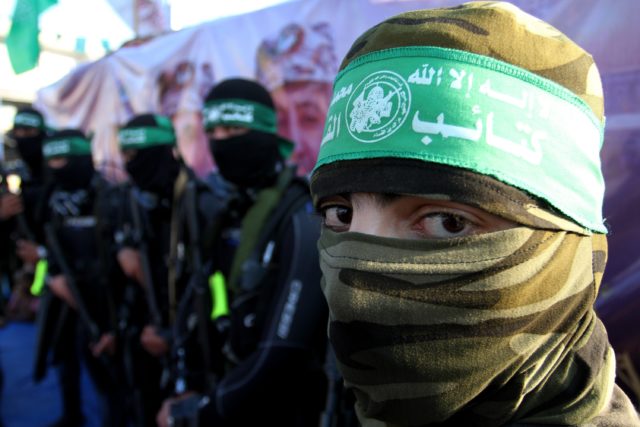
Iran continues to be the world’s leading national sponsor of terrorism, according to the United States’ 2018 Annual Country Reports on Terrorism. Amb. Nathan Sales, State Department coordinator for counterterrorism, released the congressionally-required compilation at a November 1 press briefing.
An online search showed little major U.S. news media coverage of the event or the Country Reports.
Sales highlighted what he called “three key trends that we saw in the 2018 report. First, in 2018, the United States and our coalition partners nearly completed the destruction of the so-called ISIS [Islamic State in Iraq and Syria] caliphate while increasing pressure on the terror group’s global networks.
“Second, the Islamic Republic of Iran remained the world’s worst state sponsor of terrorism, and the administration continued to subject the regime to unrelenting diplomatic and economic pressure. Third, the world saw a rise in racially or ethnically motivated terrorism ….”
Iran, Sales told reporters, “retained its standing … as it has every year since 1984. The regime often through its Islamic Revolutionary Guard Corps, or IRGC, has spent nearly a billion dollars a year to support terrorist groups that serve as its proxies and promote its malign influence around the region—groups like Hezbollah and Palestinian Islamic Jihad.
He later said approximately $700 million of Iran’s foreign terrorism subsidies in 2018 went to Hezbollah, the Lebanese Shi’ite “Party of God.” This is the “overwhelming majority” of the group’s budget, according to the Country Reports.
Hezbollah played a key role in backing dictator Bashar al-Assad in Syria’s nine-year civil war. It also has amassed a reported 120,000 or more rockets and missiles—in violation of U.N. Security Council Resolution 1701, which calls for the terrorist group’s disarmament—since its 2006 war with Israel.
The latest Country Reports also noted that Iran helps fund Hamas (Palestinian Islamic Resistance Movement), the Islamist organization that runs the Gaza Strip and has gone to war against Israel in 2008, 2012 and 2014. Like Hezbollah and Palestinian Islamic Jihad, Hamas is a U.S.-designated terrorist group.
This year’s Reports also said, “Tehran continued to allow an AQ [al-Qaeda] facilitation network to operate in Iran.” The network “sends fighters and money to conflict zones in Afghanistan and Syria, and [Iran] has extended sanctuary to AQ members residing in the country.”
“But the Iranian threat is not confined to the Middle East; it’s truly global,” Sales said. According to the ambassador, last year the Iranian terrorism threat “reached Europe in a big way.
“In January, Germany investigated 10 suspected IRGC Quds Force operatives. In the summer, authorities in Belgium, France, and Germany thwarted an Iranian plot to bomb a political rally near Paris. In October, an Iranian operative was arrested for planning an assassination in Denmark. And in December, Albania expelled two Iranian officials for plotting terrorist attacks there.”
Sales asserted that “countering Iran-backed terrorism is and has been a top priority for this administration.” He noted that in 2018 Washington hosted the first Western Hemisphere Counterterrorism Ministerial meeting. It focused “on threats close to home, particularly the threats posed by Hezbollah, Iran’s terrorist proxy.”
He called the State Department’s labeling of Iran’s IRGC as a foreign terrorist organization “the first time we’ve ever so designated a state actor.” The Revolutionary Guard Corps’ Qods [Jerusalem] Force advances Iran’s interests abroad, provides cover for intelligence operations, and creates instability in the Middle East, the Country Reports added.
“Through the IRGC-QF, Iran provides funding training, weapons and equipment for Hezbollah, Hamas, Palestinian Islamic Jihad, Kata’ib Hezbollah in Iraq and al-Ashtar Brigades in Bahrain,” the Reports said. “Iran has also provided weapons and support to Shia militant groups in Iraq and to the Houthis in Yemen.”
In addition to labeling the IRGC, State designated Jawad Nasrallah, son of Hezbollah leader Sheik Hassan Nasrallah, as a terrorist. The younger Nasrallah “recruited individuals to carry out terrorist attacks against Israel.”
Sales said designating individuals or groups as terrorists is meant to make it more difficult for them to raise funds, travel and otherwise operate.
Asked whether State’s labeling of the IRGC has affected it, considering its activities in Iraq and Lebanon, the ambassador said “we know that Iran’s terrorist apparatus has suffered major financial setbacks as a result of the … the historic [economic] sanctions that this administration has brought to bear on Iran and its terrorist proxies. And you don’t have to take my word for it. Look no further than Nasrallah, the head of Hezbollah, who has publicly appeared for donations.”
Questioned about possible Tehran-sponsored terrorism in the near future, Sales said “we are always on the lookout for Iran-backed terrorism. We know that Iran uses terrorism as a basic tool of tradecraft. It’s their go-to capability that they use to spread their malign influence around the world.”
Despite Hezbollah’s position as the dominant armed force and political movement in Lebanon, Sales said Washington would continue to provide aid to the subordinate Lebanese military. “We’ve been very clear in our dealings with the government of Lebanon that we see Hezbollah as a terrorist organization, and that is why we have worked … over many years, to strengthen the institutions of the Lebanese state, such as the Lebanese Armed Forces, to ensure that there is no felt need in Lebanon to rely on any purported services that Lebanon might receive from Hezbollah. That has been our policy and that remains our policy.”

